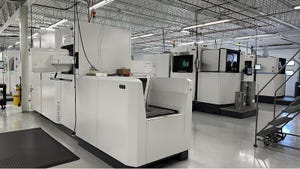The thing about the Internet of Things, says Cees Links, is that "it's very thingy."
November 9, 2016

It's not that Links, a pioneer of the wireless data industry, doesn't see the connection between the Internet of Things and the things themselves, but all the focus on the actual devices, he says, is missing the point and making everyone confused about what the business opportunity and actual potential for the industry is. >Until companies stop marketing "things" over services, the industry is simply not getting the point, says Links.
>Until companies stop marketing "things" over services, the industry is simply not getting the point, says Links.
"If things are not marketed right, people don't understand the value, and if people don't understand the value they just use a FitBit for a few weeks and then they throw it aside. That's what we are seeing a lot right now."
Indeed, FitBit shares recently took a plunge on news that the company was seeing a drop in sales and cutting its full-year earnings. The company also admitted that about 20% of Fitbit activations this quarter were reactivations by people who hadn't used Fitbit for 90 days or more. This reinforces Links' view that "things" without comprehensive services to back them up and make them compelling are short-lived.
"The underlined theme of the Internet of Things is being able to make better decisions faster," said Links, noting that being able to make better decisions faster would also be a source of job creation.
"The whole industry is capable of analyzing data and making sense out of it, extracting knowledge out of data, or at least extracting information out of data," he added.
This, said Links, would require a new class of engineers that would build things that are generally safer and more secure, while activating mathematicians to do data mining and data analysis to contribute to overall system design.
"I think the hardware engineers have done their job, at least at this stage, now it's very much up to the software engineers being able to build out the systems, and the engineers who do data analytics."
Links said the most frequent questions and concerns he hears revolve around the privacy and security of the various "things" collecting data and saving it to the cloud. People often ask him how to make the systems safer, more friendly, and easier to install.
 Join Cees Links in the ESC Engineering Theater. Links will be in the ESC Engineering Theater at ESC Silicon Valley, Wednesday, Dec. 7, 2016 at 11 a.m. Register here for the event, hosted by Design News’ parent company, UBM.
Join Cees Links in the ESC Engineering Theater. Links will be in the ESC Engineering Theater at ESC Silicon Valley, Wednesday, Dec. 7, 2016 at 11 a.m. Register here for the event, hosted by Design News’ parent company, UBM.
"People have very many concerns about standards, and many concerns about security," he acknowledged, but added that privacy and security were not specific to the IoT, but to the Internet in general, and also to the physical world. One could theoretically just as easily lose the physical keys to one's house as to have one's digital lock hacked.
"I have only one main pitch and that is for companies to understand how they can make money and with what type of service, and then to start implementing that service." It's inevitable, said Links, that technical challenges would crop up along the way, "but those are the things that you then need to resolve. Don't start with things like 'what communication standard do I need to use?' or with some hardware design. It is very much 'how can I make money and with what type of service' and then tracking back from there."
Links said there are four simple tenets to overall system design, "you need sensors, you need data analytics, you need an application, and you need a billing and support system." Everything else, he said, is simply "a lot of distraction" over "nice sensors" which Links believes are just a "small part of the whole game."
Ultimately, Links is still an idealist. "I believe that a connected world is a better world, and I think we can do a lot with the technology to make our lives better, to make the world better, by creating connectivity. Connecting the world is the greatest thing to live by as an engineer."
A regular speaker on the tech conference circuit and a Senior Director at FTI Consulting, Sylvie Barak is an authority on the electronics space, social media in a b2b context, digital content creation and distribution. She has a passion for gadgets, electronics, and science fiction.
About the Author(s)
You May Also Like



